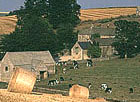CAP Health Check: verdict
Common Agricultural Policy (CAP) Health Check: the CLA and NFU give their verdicts


Exquisite houses, the beauty of Nature, and how to get the most from your life, straight to your inbox.
You are now subscribed
Your newsletter sign-up was successful
Common Agricultural Policy (CAP) changes could create trade distortions within the EU, says the The Country Land and Business Association (CLA), while the National Farmers' Union (NFU) believes the reform does not go far enough.
Health Check proposals include the optional move to flat-rate payments, but the CLA and NFU believe this will allow too much member state discretion.
Henry Aubrey-Fletcher, the CLA's President, said: 'This opens the prospect that they will be implemented differently around the European Union, potentially creating distortions to trade. It is the Commission's role to stop such distortions.'
The CLA and NFU welcomed the abolition of set aside and milk quotas. Mr Aubrey-Fletcher said: 'It makes no sense in a hungry world with serious food price inflation to be artificially holding back EU production.'
Peter Kendall, President of the NFU, said: 'The Health Check is intended to be an adjustment to the CAP, not another radical reform.
'The problem with the last reform in 2005 is that it made the CAP more complicated and less common. The Health Check is an opportunity to correct those mistakes and we welcome the move towards a more level-playing field, but this does not go far enough.'
Single Payment Scheme revisions have been welcomed by the CLA and NFU. Mr Aubrey-Fletcher said: 'The proposal for lower limits for the single payment of 250 euros or one hectare is sensible. However, the suggested progressive modulation is an unwelcome complication and a contradiction of the desire to move to flatter rate payments within a region.'
Exquisite houses, the beauty of Nature, and how to get the most from your life, straight to your inbox.
Mr Kendall stated: 'The Health Check proposals will take the CAP in the right direction, but do not go far enough in eliminating the potential for different treatment for farmers across Europe.'
Common Agricultural Policy (CAP) changes could create trade distortions within the EU, says the The Country Land and Business Association (CLA), while the National Farmers' Union (NFU) believes the reform does not go far enough.
To comment on this article, use the comment box below, or email us at clonews@ipcmedia.com. Read more about the countryside.
Country Life is unlike any other magazine: the only glossy weekly on the newsstand and the only magazine that has been guest-edited by His Majesty The King not once, but twice. It is a celebration of modern rural life and all its diverse joys and pleasures — that was first published in Queen Victoria's Diamond Jubilee year. Our eclectic mixture of witty and informative content — from the most up-to-date property news and commentary and a coveted glimpse inside some of the UK's best houses and gardens, to gardening, the arts and interior design, written by experts in their field — still cannot be found in print or online, anywhere else.
